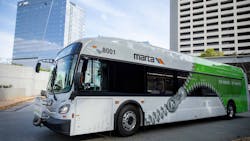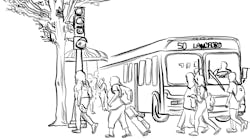FTA issues Dear Colleague letter outlining guidance to bolster U.S. bus manufacturing
The Federal Transit Administration (FTA) issued a Dear Colleague letter that provides guidance and outlines several tools available to U.S. transit agencies procuring transit vehicles with federal funds.
The Dear Colleague letter follows discussions between FTA, transit vehicle manufacturers, industry associations, transit agencies and supply companies on the challenges facing bus manufacturing, particularly lower and zero-emission bus manufacturing.
These challenges include hyperinflation and supply chain issues that have reduced the number of heavy- duty transit vehicle manufacturers (TVM) in the U.S. from five a year ago to two. FTA’s letter notes its discussions with stakeholders placed attention on the increased costs to transit vehicle manufacturers of financing vehicle production from award of a contract through delivery and acceptance of the vehicles by transit agencies.
The letter explains the following tools can be used by transit agencies and TVMs:
- Contract modifications for price adjustments are allowed depending on factors, including contract terms, applicable local, state or tribal procurement law, the terms of a price adjustment and the scope of the contract modification.
- FTA grant recipients can seek additional federal funds to cover contract price increases while FTA formula and certain other federal funds can be used to cover contract modifications for price increases.
- New procurement clauses such as price adjustment clauses and a “brand name or equivalent” clause.
- Advance payments, which allows a contractor to receive payments prior to the contractor incurring costs.
- Progress payments, also known as milestone payments, allow a contractor to receive payments prior to all work being completed.
- If no advance payments or progress payments are being made, no performance bond or letter of credit is required under federal law. However, if advance or progress payments are being utilized, security is required.
FTA’s letter also encourages federal funding recipients to utilize procurement strategies such as state contracts and performance-based specifications to lower costs of the procurement.
Additional actions by FTA to strengthen the bus manufacturing industry include:
- A new bus procurement webpage, with updated FAQs
- New priority considerations in the Fiscal Year 2024 Buses and Bus Facilities and Low or No Emission Notice of Funding Opportunity
- An FTA-hosted bus procurement best practices webinar
- National Transit Institute procurement courses
- Formation of a new FTA Acquisition Oversight Division, with a team dedicated to technical assistance and resources supporting third-party procurements.
White House roundtable
The FTA’s Dear Colleague letter was issued on the same day that industry stakeholders gathered in Washington, D.C., for a discussion on clean bus manufacturing. The roundtable was held to highlight progress in transitioning to low- and zero-emission public transit buses in the U.S. and to help address challenges facing the U.S. bus manufacturing industry during the transition.
The Center for Transportation and the Environment (CTE) moderated part of the discussion titled Reducing the Cost and Complexity of FTA Funded Transit Bus Procurements. CTE Executive Director Dan Raudebaugh presented industry opinions identified through the FTA’s Transit Vehicle Innovation Deployment Centers (TVIDC) program.
Through TVIDC, FTA works with industry stakeholders to solve challenges, increase efficiency and reduce the costs and risks of deploying zero-emission vehicles in transit operations. On Jan. 19, 2024, FTA engaged CTE under the TVIDC program to host an industry stakeholder group to review the challenges related to bus specifications and customizations and to explore potential solutions. CTE provided a draft report to FTA based upon the stakeholder group’s reactions to a list of 20 potential solutions that could ultimately incentivize better manufacturing economies of scale, create healthier supply chains, reduce TVM parts inventories and, ultimately, create both lower prices for transit operators and healthier TVM margins.
The American Public Transportation Association (APTA) presented recommendations developed by its Bus Manufacturing Task Force to fortify a more competitive and stable domestic bus manufacturing industry. APTA explains the recommendations will help ensure U.S. capacity to manufacture and deliver clean buses at the scale and pace needed to meet market demands and achieve national climate and equity goals while reducing costs.
To help address immediate cash-flow shortages, the task force recommended transit agencies incorporate three changes in bus contracts: Price adjustments, progress payments and use of price indices. Other immediate actions that the task force recommended include developing a set of bus procurement best practices and exploring ways to reduce customization in bus design.
“Converting to low- and zero-emission buses and building the necessary charging and fueling infrastructure will deliver substantial operational and maintenance savings, make our communities healthier and more equitable and support national climate goals but the transition comes with challenges,” said APTA President and CEO Paul P. Skoutelas. “Today’s productive discussion with federal officials and other key partners underscores the critical need for ongoing cooperation around next-generation public transportation to ensure America’s future strength, success and prosperity.”
APTA expressed gratitude toward the White House and FTA for collaborating with the association and its transit and business members.
“Preserving, protecting and nurturing a highly competitive U.S. bus manufacturing market and building the capacity to transition to low- and zero-emission buses is essential,” said Skoutelas.

Mischa Wanek-Libman | Group Editorial Director
Mischa Wanek-Libman is director of communications with Transdev North America. She has more than 20 years of experience working in the transportation industry covering construction projects, engineering challenges, transit and rail operations and best practices.
Wanek-Libman has held top editorial positions at freight rail and public transportation business-to-business publications including as editor-in-chief and editorial director of Mass Transit from 2018-2024. She has been recognized for editorial excellence through her individual work, as well as for collaborative content.
She is an active member of the American Public Transportation Association's Marketing and Communications Committee and served 14 years as a Board Observer on the National Railroad Construction and Maintenance Association (NRC) Board of Directors.
She is a graduate of Drake University in Des Moines, Iowa, where she earned a Bachelor of Arts degree in Journalism and Mass Communication.



